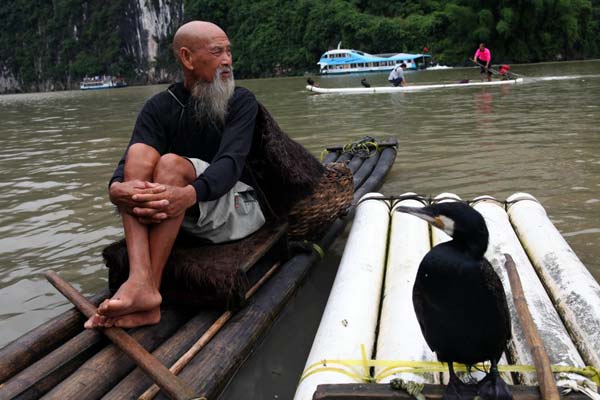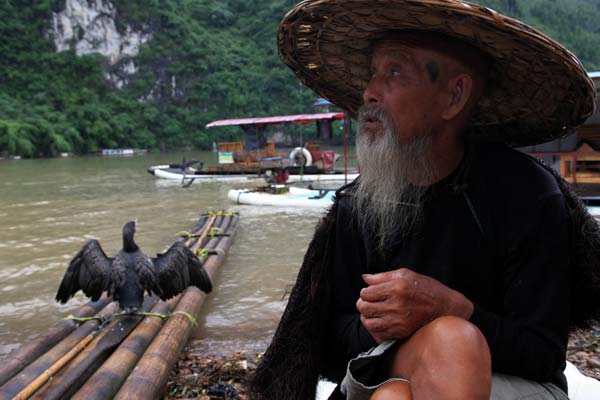Enterprising villagers lure visitors with comorants

 |
|
Because there are less fish, tourism has become an alternative source of income for former fishermen like Huang Yuechuang. Huo Yan / China Daily |
Huang Yuechuang and Huang Yueming are hard to miss.
Tourists to Yuye, a village in Yangshuo along the scenic Lijiang River in Guangxi Zhuang autonomous region, usually hear their voices first.
Shouting "pictures, pictures" continuously, the brothers try to attract visitors to take photos with their two cormorants perched on their shoulders. Each photo costs 2 yuan (30 cents).
But, the brothers did not do this all their lives.
Huang Yuechuang, 76, and his brother Huang Yueming, 56, used to be fishermen. Huang Yuechuang says back in their heyday, the cormorants used to be their loyal fish catchers.
"We were able to fish more than enough each day with the help of our cormorants," he says. "They are part of our family."
The brothers still own their fishing boats, which now function only as their home and not as a tool to catch fishes.
"We used to lure fish by lighting up the traditional lanterns around our boats, when the sun goes down. It is called lantern fishing," says Huang Yuechuang. "The lanterns are more beautiful than the stars at night," he adds.
But the fishermen in Yuye have stopped doing this because they claim there are no more fish.
"Since the dam was constructed downstream on the Lijiang River to build hydropower station, we've lost our source of income," says village head, Huang Gaolian.
"Although the government has added fish upstream, as soon as the gate of the hydropower station opens, those fish are flushed downstream. To make matters worse, some fishermen use electric shock methods to fish."
Because of the depleting fish population, many of the younger villagers have moved to cities in search of a better life. Only older folks, like Huang Yuechuang and his brother, are staying behind to try to make a living from tourism.
It's a trial and error venture. The cormorants are not cheap to maintain. They feed on fish only and because there are no more fish in the river, the villagers buy them from the market.
"We spend about 5 yuan to feed each cormorant every day," Huang Yuechuang says, adding that on good days, he makes about 50 yuan from photo taking. Some days, he goes home empty handed.
Village head Huang Gaolian says he has been scratching his head to try to find an alternative source of income for the fishermen.
"Since tourists are interested in seeing the traditional way of life here such as fishing with cormorants and lantern fishing, developing tourism seems to be the only way out for them now," Huang Gaolian says.
"At least, they can still keep their cormorants," he adds.
Wen Wen in Beijing contributed to the story.
huoyan@chinadaily.com.cn
















